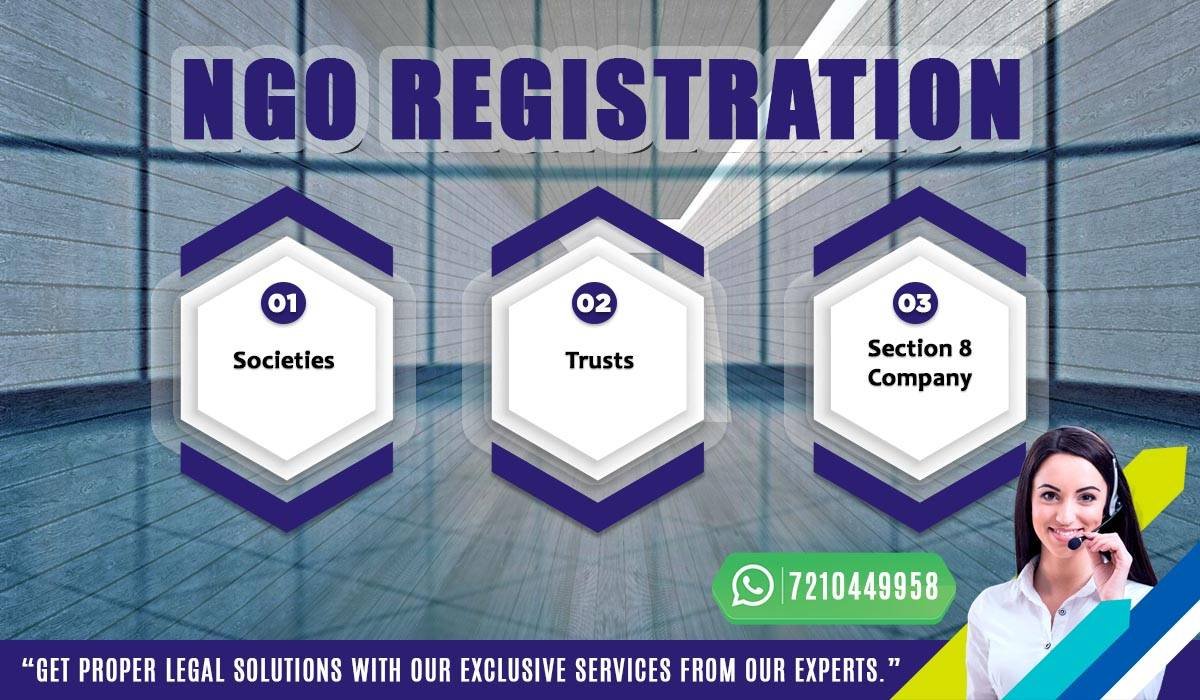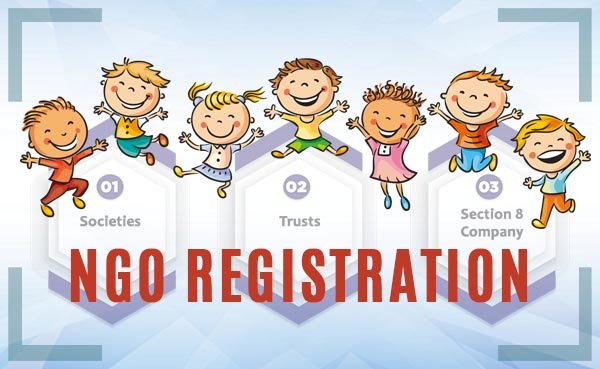NGO Registration Online
Non-Governmental Organizations (NGOs) play a pivotal role in addressing various social, economic, and environmental issues in India. Their contribution ranges from providing education, healthcare, and social welfare services to advocating for policy changes and environmental conservation. To operate legally and effectively, NGOs must undergo a registration process that grants them official recognition and access to various benefits and support systems.
Register your NGO hassle free with our online NGO registration services. Our experts will help you with everything, from selecting the right type of registration to submitting all necessary documents. Gain legal recognition, tax benefits, and credibility with our fast and affordable NGO registration services.

Is it mandatory to register an NGO?
NGO registration services are vital for several reasons. First, they provide legal recognition to your organization, ensuring credibility and transparency. Registration is not just a formality but a validation of your commitment to social causes.
It also opens doors to various funding opportunities, grants, and collaborations, allowing your NGO to make a more significant impact.

Registered NGOs gain tax exemptions, which can be a significant advantage in channeling more resources towards your mission. Donors often prefer supporting registered NGOs as it assures them that their contributions are being utilized responsibly and in accordance with the law.
Different Types of NGO Registration
NGO registration comes in different forms, each serving a specific purpose. The most common types include:
- Trust Registration: A trust is a legal entity that holds and manages assets for the benefit of others, usually in the form of a charitable cause.
- Society Registration: Societies are typically formed to promote science, literature, fine arts, education, or charitable activities. They are governed by a group of individuals forming the managing committee.
- Section 8 Company Registration: These companies are established for promoting commerce, art, science, sports, education, research, social welfare, religion, charity, protection of the environment, or any other charitable purpose.
Choosing the right type of registration depends on the nature and scale of your NGO’s activities.
Eligibility Criteria: Who Can Register?
NGO registration is open to individuals, groups, or associations committed to social welfare, charitable activities, and community development. The eligibility criteria typically revolve around the NGO’s objectives, ensuring they align with the greater good and adhere to legal standards. NGOs focusing on education, healthcare, environmental issues, or any other social cause are eligible for registration.
At NGO Partner, we are dedicated to assisting organizations that share our passion for positive change. Our online NGO registration services are designed to cater to a wide range of NGOs, simplifying the process and ensuring compliance with eligibility requirements.
Documents Required for NGO Registration
The documents required for online NGO registration in India can vary slightly depending on the type of NGO you are registering (Society, Trust, etc.) and the state you are registering in. However, there are some general documents that are almost always required:
- Digital Signature Certificate (DSC): A DSC is a digital equivalent of a physical signature and is required for filing online forms and documents. You can obtain a DSC from any authorized Certifying Authority.
- Memorandum of Association (MoA) or Trust Deed: The MoA is the basic document that outlines the constitution of the NGO, its objectives, and its activities. The Trust Deed serves a similar purpose for trusts.
- Proof of Address of the Registered Office: This could be a copy of your electricity bill, water bill, or property tax receipt.
- Identity Proof of Governing Body Members: This could be a copy of their PAN card, Aadhaar card, or voter ID card.
- Bank Account Details of the NGO: This includes the bank name, account number, and IFSC code.
Additional documents that may be required:
- List of Governing Body Members
- Audited accounts for the past 3 years (if applicable)
- Project proposals (if applicable)
- NOC from the landowner (if the registered office is not owned by the NGO)
Can We Run an NGO Without Registration?
While it is possible to initiate charitable activities without formal registration, doing so limits the growth and impact of your NGO. Unregistered NGOs face challenges in terms of credibility and access to resources. Many funding agencies and government bodies require NGOs to be registered to ensure accountability and adherence to legal norms.
Moreover, registration provides a legal framework for your organization, protecting it from potential legal issues. In the long run, the benefits of NGO registration far outweigh the challenges, making it a crucial step for those committed to creating lasting social change.
NGO Partner's NGO Registration Online Services
To streamline the registration process, our organization offers NGO registration services online. In India, 2023’s best NGO registration companies, particularly in Delhi, provide comprehensive assistance in navigating the legalities and paperwork involved. Leveraging their expertise ensures a smooth and efficient registration process, allowing you to focus on your core mission—making a positive impact on society.
In conclusion, NGO registration is not just a legal requirement but a strategic move to enhance the credibility and effectiveness of your organization. Choosing the right type of registration and availing the services of the best NGO registration companies in 2023 can set your NGO on a path to meaningful and sustainable change.
Other Important Registrations for Your NGO
Beyond the primary NGO registration, certain additional registrations can amplify your organization’s impact:
- 12A Registration: This registration allows your NGO to be exempt from income tax, enabling you to allocate more resources to your mission.
- 80G Certification: Acquiring 80G certification makes donations to your NGO eligible for tax deductions, attracting more donors and supporters.
- FCRA Registration: For NGOs engaging in foreign contributions, FCRA registration is crucial to ensure legal compliance and transparency.
By partnering with the best NGO registration company in India 2023, such as NGO Partner, you gain access to expert guidance on these additional registrations, maximizing your NGO’s potential for growth and sustainability.
To register your NGO, follow these steps: 1. Choose a unique name. 2. Draft a constitution outlining your mission and activities. 3. Gather a board of directors. 4. Register with the appropriate government authority. 5. Obtain necessary approvals. 6. Open a bank account. 7. Fulfill reporting requirements. Check local laws for specific details.
The initial cost to start an NGO varies widely based on factors like location, scale, and activities. It can range from a few hundred to several thousand dollars. Essential expenses include registration fees, legal documentation, and operational costs. Detailed budgeting based on your specific goals and context is recommended.
While it’s possible to operate some nonprofit activities informally without registration, official registration offers several benefits. Registration enhances credibility, facilitates fundraising, and provides legal recognition. However, requirements vary by jurisdiction. Check local laws and regulations to determine if registration is mandatory and to understand the benefits and obligations associated with running an NGO.
The tax treatment of NGOs depends on the jurisdiction and the specific tax laws governing nonprofits in that area. In many countries, registered NGOs enjoy tax exemptions on their income as long as they meet certain criteria and operate exclusively for charitable or social purposes. It’s crucial to consult local tax authorities to understand the tax obligations and benefits for NGOs in a specific location.

